Enshittification: America's Safe, Meritocratic Slide into the Sewer
How bureaucracy, GDP worship, automation, AI, HR, acronyms, statistical analysis, and the death of intangibles are pouring the proverbial bucket of hot diarrhea over America.
You wake up.
You’re covered in polyester and nylon microplastics that have been outgassing in your face all night. You’ve been breathing them in for 8 hours. You’ll breathe them in for another 9 at work.
You roll out of bed and lazily saunter into the bathroom, continuing to inhale a slurry of microplastics, fiberglass from your cheap-construction apartment, trace exhaust fumes from the nearby overpass, mold spores, and the weed from your downstairs neighbors leaking in through the cheap ventilation system.
You grab a quick shower: a placating 10 minute affair consisting of being dowsed in lukewarm city tap water and parabens from your shampoo. The water itself is a sinister brew, a concoction of industrial and fertilizer runoff, forever chemicals, and the remnants of the EPA’s last experiment on the waterways near your house.
You grab a microwavable breakfast, idly scrolling your phone while the waffle and sausage biscuit orbit the clear plastic visor separating you from your meal. It sits on a plastic plate, only recently divorced from the plastic wrapper that protected it from the outside world while it traveled from distribution centers on the West Coast to your Midwestern suburb. Synthetic coffee, pressed through several layers of cheap industrial paper and plastic, gurgles in its pot while you catch up on your TikTok algorithm. You can’t find anything good past all of the sponsored posts.
Defeated, You grab your belongings and make for your leased 2018 Honda Civic. On the way to work, a new arrival from Venezuela nearly careens into you in her 2025 Nissan Altima. She was watching dance routines on her phone and didn’t see the light change. Swerving into the next lane to avoid a very expensive accident, the homeless camps in the strip mall parking lot (next to the liquor and African beauty products store) catch your eye. A pride flag waves stoically above it all, as if to bolster the strength of those gazing upon it: we suffer, not for glory or riches, but for diversity. A woman sips her $8 coffee underneath its warm embrace, before a resident of the homeless camp rushes behind her with a 5 gallon bucket of hot diarrhea and offers a “warm embrace” of his own.
Is this really America?
Well, hopefully your morning isn’t always that bad. But, the little vignette highlights exactly what’s going on in America (and the rest of the world, to a lesser extent) today.
Society is entering a paradigm that is somewhere between the Ship of Theseus and a game of Chicken. How many floorboards of the old Anglo yeoman culture can we yank out and replace before America stops being a country and becomes an Economic Zone? It’s all getting enshittified.
Everything, from government to media to interactions with others to your furniture to the food you eat to clothes you wear to the very chemical makeup of your testicles is being enshittified.
The internet will tell you that enshittification the slow decay of a software or platform into a garbage, microtransaction riddled hellscape. I argue that relegating it to merely our digital lives is far too narrow. We live in an era where enshittification encompasses all facets of life. It’s unavoidable as the years tick by. Our entire lives can feel like one long nasty discovery of rot, the feeling that whatever you’re encountering looks like it’s supposed to on the surface, but closer scrutiny reveals that, oh, it’s also maddening garbage.
The American existence today feels like being a home inspector called to the site of a new stick-built: it looks like a house as long as you stand 15 feet back and squint. The “house” is actually a sagging heap of garbage stapled together by illegal immigrants that will collapse in 10 years.
How many of these have you experienced before?
You call tech support for the very expensive electronic device you just purchased: an Indian in New Delhi picks up. Neither of you can understand what’s being said, outside what you deduce is shilling of a subscription for your device.
You try to see a doctor: 15 layers of bureaucratic purgatory emerge. You need one-time-codes to sign in to the sign-in menu, to get into the dashboard, to receive a .pdf file for insurance claims, to be referred by your primary care provider for a 10 minute appointment 6 months from now. When you get to see the doctor, it’s a Howard “graduate” who summarized her textbooks with AI. Ditto for the PA, a new arrival from Pakistan. Last year, he was selling subscriptions in that call center.
You try to watch a YouTube video: after 3 minutes of unskippable pre-roll ads, the creator soft-launches into a lengthy sponsored segment for BetterHelp, Nebula, Factor, SkillShare, Incogni, or whatever other garbage is doing the rounds this fiscal quarter. After it ends, you’re berated with detailed instructions about “liking and subscribing to ensure you don’t miss out on a new Raycon Headphones sponsored segment”. You try to revisit a classic video only to find out it was copyright-striked by a bot 5 years ago.
You try to buy a printer: it needs to phone home to China and charge you legitimately extortionate prices on specific ink on a tiered subscription plan. You only print out the occasional black and white Word document.
You try to scroll one of your algies: endless advertisements, suggested posts, and people attempting to algorithm-bait. It’s all curated by a new AI model that “deprioritizes” content that is not hugbox approved. Content that you actually want to see must self-censor or risk getting shadowbanned. iFunniers, this one was for you!
You go out with your friends to do something offline, it doesn’t matter what. Let’s say minigolf: a diarrhea tsunami of waivers, liability disclosures, fees, and safety briefings crests the horizon and must be dredged out one hot bucket of diarrhea at a time. Finally, you earn the right to access the course— under the watchful eye of the deputized 16 year old manning the golf hut, walkie talkie in hand. Every single real-life activity now requires an “account” where your information is auctioned off to data brokers.
Every game you play is riddled with microtransaction gimmicks designed from the ground up, by armies of professional psychologists straight from the casino, to squeeze the maximum amount of money out of you as possible— to include straight up creating home-destroying addictions. “Standard edition” tier AAA games are $80 for a revokable license (rental) now, btw.
Like a new wave-partical duality, every movie you’ve ever wanted to watch is simultaneously on your subscription service at a tier you don’t have, and also instantly transported to a streaming service you don’t have. Only $3.99 for a 24hour rental on YouTube doe!
Every road you drive on that isn’t a country backroad is somehow a toll road, backed up during non-peak hours, and full of potholes.
The car you do manage to lease in this horrendous used car market is a computer with wheels wrapped in plastic, far more concerned with the infotainment system than providing a reliable driving experience. It is constantly collecting telemetry data to sell to insurance companies. Your gasoline engine requires a software update btw.
Your payments on this car are determined by a credit score you never asked for. Managing it requires satisfying an all-seeing algorithm that monitors immense amounts of data about each and every transaction you make. Companies asking “too hard” about your score lowers it, btw.
Sigh..
Why? Why is everything so SHIT NOW!!!!!!!!
I don’t agree with “teasing out” the point of my writing, so here it is:
The Unchecked Power of the Merchant Caste.
I got the idea of the eternal “Merchant Caste” from Asha Logos, one of my favorite video essay YouTubers. I really like his “parallel institutions” video. I say that with the disclaimer that his views are pretty out there, especially his critiques of Christianity. His videos about Christianity, for example, are pretty much Pagan fanfics that attempt to paint Justinian (?) as Literally Hitler for pre-Christian European religions by weaponizing Procopius’ (alleged) Secret Histories (published voluntarily by the Catholic church btw). Rather strange villain for Pagans.
Anyway, he has a really good video that lays out the basic way societies have been organized throughout the various epochs of history. There’s kings/rulers, warriors, farmers/producers, merchants, and the clergy. Each has taken a turn in the spotlight of history, and the basic argument goes that too much power consolidated by any one faction creates issues.
Well, take one guess which caste rules the US now. This doesn’t just mean they’ve temporarily conquered institutions and put their guys on the throne for a temporary season in the sun. No, they’ve completely rebuilt Western society in their image because they’ve been sitting on the throne for some time. There is no line of warriors and kings waiting off stage for their turn. At a minimum, merchan-tifying the West has been gathering momentum since the end of WWI, beginning to crescendo into a frenzied scramble around the 1980s. Maybe it’s really been underway since the hot philosophers of the mid-Enlightenment era (Locke) began ordering society around property rights.
The point is, these guys have shaped society to fit their model for a long time. What does that mean? What traits does a merchant caste led society exhibit?
Efficiency Worship:
Efficiency has become the primary virtue of American civic life. In American society (especially American industry), its seen as a given that you will always take the most efficient route and that you’re always “optimizing and refining” whatever it is you do. 21st century Americans would rather be efficient than free, strong, healthy, or happy. After all, a small oversight correction might boost your bottom line by .0005%! Don’t you want to streamline? Yes you do! In fact, businesses are legally obligated to do this at all times.
This is why I always say that the most powerful piece of technology ever created (after the internet) is Microsoft Excel, far beyond the atom bomb. Excel (really the whole Microsoft Office suite) is the king of efficiency. It is critical in distilling extremely complex pieces of information into easy-to-digest reports, typically a binary Y/N or percentage. Sometimes the cells are even colored for easy interpretation by unremarkable middle managers that need to make “snap judgements” (more on that below). Excel can take a situation with impossibly large amounts of nuance and boil it down to a series of algorithmic inputs calculated by a computer. Over time, these people’s entire epistemology takes on the appearance of a spreadsheet. Like I’ve written before, the medium you consume media in imprints itself in the way you absorb and interpret that information. Spreadsheets are designed for quick decisionmaking, especially when they’re presented to someone that didn’t work on them. Copy and paste this process for 30 years, and you get very powerful executives that cannot help but think like a spreadsheet. They see the world in algorithms and formulas. But is it that simple?
Here’s an easy one: are you happy? You might be able to answer this question, but the HR departments of the world want to know how to answer this question without asking you, because involving you is much less efficient in their paperwork ecosystem. So, they gin up a little algie: they quantify everything from your sleep schedule, fitness activity, lifestyle habits, number of friends, salary, family history, etc. before mashing them up into a binary or percentage that deduces your likelihood of dying (or, more importantly, if you’re going to need expensive medical care in the process of dying). This isn’t a joke. This is how insurance companies calculate the “risk” of insuring you.
See the problem yet? Your entire experience of being alive, reduced to a few stats fed into Excel against your will to be consumed by someone who “knows you” without ever having met you. There’s something soul destroying about that. Is your existence really so unimportant and crude that it can be reduced to metrics in spreadsheet software? Do those numbers tell the whole story of what it means to be you?
When the entire world is run like a factory, we lose what it means to be human. Human beings are not meat powered computers piloted by a brain capable of accepting infinite programming to be maximally efficient at all times— despite what Reddit soyence shrieks, this is the definition of inhuman. Humans are naturally inefficient. We can only stay on task for so long. Our thoughts wander, we dabble, sometimes we willfully choose to not take the path of least resistance. Part of being a good leader is accepting that human beings are not computers, nor is it forcing them to pretend to be computers good for anybody.
Yet, the merchant caste elites that govern the world think making people lobotomized labor dispensers is not only possible, but a worthy goal. After all, think of the GDP per capita! And so spreadsheets are their weapon of choice for maximizing efficiency by molding your very existence in their image: the image of the calculating, ruthless empowered merchant caste.

The most abstract factors in your life (perhaps an unauthorized hobby that leaves you mildly fatigued) can reduce efficiency by some atomically small percentage. No longer! Thanks to spreadsheet software and their ruthless operators, these irregularities can be identified and destroyed. Now we have Amazon wage cages that can remove the five minutes a day (of your eight+ hour shift) where imprecise movements, hesitation, or incorrect box packing procedure costs the company money because you might’ve packed 23% of another order in that wasted time.
“Line go up” is not just a quirky financial strategy for merchants. It is a pathology lying somewhere between a sexual fetish and a truly mentally ill obsession. These people live their entire lives thinking about quarterly earnings reports.
What’s even worse, the merchant caste elites foisting this destructive obsession on the planet are not fringe, autistic businessmen. They’re consistently some of the most powerful people on earth (powering past heads of state and the kingly caste), and they’re rebuilding civilization in their image like little gods of efficiency. Out with small talk, inconsistency, downtime, qualitative analysis, whimsy, and novel experience. In with spreadsheets, ledgers, “slide decks”, and paperwork. QUANTIFY EVERYTHING!!!! After all, this is the most efficient means of collecting and transmitting information.
Nobody is safe from this.
Not your grandma’s Mega Prot “nondenominational” Church, which is run like a little corporation complete with investment groups consolidating “intellectual property” into one brand.
Not even the military, whose culture is increasingly mimicking the corporate world of the 2000s: acronyms, glide paths, cliches (“boiling the ocean”, anyone?) and most of all, an all-encompassing, unrelenting lust for PowerPoint. Think of how many unique technology platforms are in an around the modern battlefield today. Replacing or modernizing these systems is an important task, right? Sure, and here is how acquisitions merchant caste nerdoids make the system “work”:
Ok, but that’s boring logistics work. What about killing people and winning territory? Amazingly, even the process of war itself can be put on the wrack of PowerPoint and tortured through the process of being distilled into to an unholy computer graphic. In fact, here’s how the entire counterinsurgency effort went:
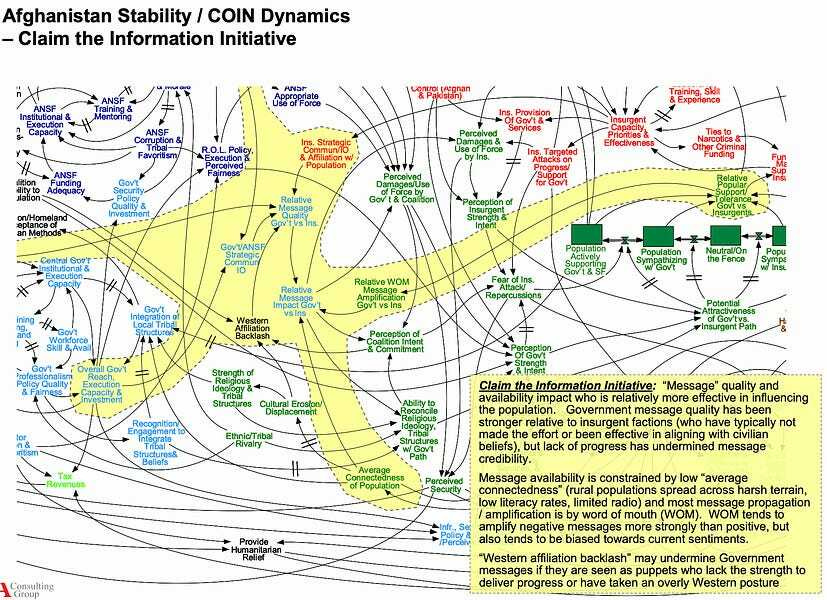
Just kidding, this is actually only a “snapshot” of a much larger single powerpoint slide:
Surely, all of these very smart, very important people with access to all of this very important information achieved great results..right?
One last example from this excellent Twitter archive:
But it’s EFFICIENT!!! Can you think of a better way of conveying that much information? It’s the safe, logical bet! Maybe, but it also breeds a certain type of desk jockey that has to be fluent in bureaucrat to deal in information of that volume—which is a soul destroying process. Some guy that could’ve worked with his hands for a living, raising horses or working on diesel engines in the local community, is now a hunched over pencil neck clattering away on behalf of a NYC-based corporation (or DC, for the Marines) for life. He can only see the world as a massive repository of data to be catalogued. Who benefits from this exchange?
Another example of efficiency worship: Media. The media we are exposed to today is not (typically) crafted by writers, filmmakers, directors, etc. It’s produced, en masse, by algorithms, study groups, corporate boards, and earnings reports. Seriously. The cliche example here is Marvel, but its a cliche because it’s true. Every Marvel film is functionally the same product. They all have the same overarching plot, story beats, awkward humor, adorable sidekick, etc. This is because focus groups and analytics data centers have calculated the highest revenue based on test audiences and prior performance analytics. There are no genuinely interesting or novel Marvel movies because it’s singularly efficient to just keep making the same movie with new IP pressed on top like a screen printed T shirt. Realistically, Marvel has made, like, 5 movies total. Even still, these films are shot to have multiple contingencies on standby: multiple endings, multiple plot threads, multiple character arcs, multiple gags in the same scene— anything to hedge the bets of the investors. Can a genuine piece of art resemble a “choose-your-own-adventure” Frankenstein? Can you determine the worthiness of art based on a Rotten Tomatoes percentile score?
This happens all the time, btw. Executive boards are keenly involved in the process of “green lighting” (accepting financial risk to produce) pretty much every major form of media today. This was even a trope back in the day with record deals, you’d have a fat cat Rush Limbaugh phenotype deciding if a band were good enough to be signed— completely detached from the people who actually consume that music. It even happens with bizarre formats like books. Michelle Obama’s “autobiography” was produced by a horde of mercenary analysts in a data center, for instance. Today, there is no fat cat behind the desk deciding if your scrappy little outfit can be the next big rock band. Instead, its an obese black lesbian that just reads an Excel report produced by an analytics team.
Centralization and Overregulation:
There are too many variables for Excel to calculate when information, power, influence, and decision-making are kept at a parochial level. If there’s one requirement for the merchant caste, it’s information reporting. These people are feral for being fed enough information. Merchant caste types in the government are so rabid for this, they made a new secret police (DHS) that has massive “fusion centers” that exist at taxpayer expense solely so someone from NSA can work in the same cubicle subdivision as someone from FBI to reduce “information silos” when they bypass Constitutionally erected barriers designed to stop the wanton collection of information on American citizens. Yay!
Merchant-types want to be fed every conceivable piece of relevant information so they can decide what information is relevant. They don’t want it to remain at a level the panopticon can’t see. After all, that wouldn’t be reasonable would it? Here’s a favorite example, this bloated nightmare of a “camping permit”:

This garbage seeped out from the cloaca of “Gerrish Township” because some bureaucrat deduced there is a conceivably possible edge case in which the home address of camper is useful.
Instead of allowing something to occur in an unregulated environment, it’s far more efficient to concentrate these dangerous commodities in sterile panopticons where even mundane supervisory activities are subject to review by a central commission— itself bound by the awesome power of depleted uranium-level dense regulation.
Of course, this regulation must itself be centralized to prevent upsetting bureaucrats at various levels of power because they can’t access compartmentalized information.
Think about something society has a need for, but that has no right being centralized. I’ll pick one, the DMV (Sorry Libertarians, but it’s mostly reasonable to make sure there aren’t blind old ladies whipping Mad Max lynchcinerators through school zones). This “inch of necessity” has been dragged out into the “Googleplex parsecs of bureaucracy”. The DMV is an entire industry now. There’s offices in every state and a headquarters in the nation’s capital replete with board rooms, labyrinthian cubicle farms, and many tens of thousands of screens manned by many tens of thousands of unimpressive black women. There are policies and statues and guidelines and administrative requirements for everything, months-long delays for paperwork, etc. It’s effectively its own little government now. I mean, there might be more rules, laws, ordnances, statutes, instructions, and decrees from the DMV than existed in the entirety of English society from the Norman invasion to WWI. And those guys conquered the world! The DMV can’t even conquer the road you drive to work on.
But it’s “efficient”, and centralized! How rational!
Here’s something I hope you’ve never had the unpleasant experience of encountering before: the Code of Federal Regulations. It’s designed to be a “snapshot” of applicable regulation that spans pretty much every aspect of American life. From transporting hazardous materials down a highway, to fishing in public waterways, to unloading Temu shipping containers on American shores, the CFR is there to prohibit something.
This is a “Snapshot”, a non-exhaustive primer designed to point you towards the commiserate applicable regulation somewhere else.
It’s 250 volumes and 200,000 pages.
We’ve added 38 THOUSAND pages in 20 years. I’m not joking.
Has American life improved in the last 20 years?
Not since the Ming Dynasty has a political body attempted to legitimately regulate every single element of human existence. This is a Tower of Babel-tier futile disaster, human brains and societies do not work like this. Again, we aren’t computers that can accept near-infinite instructions and remember them all. And these bureaucracies cannot possibly attempt to enforce all of these rules simultaneously. But, our slave drivers mush on, because every new regulation centralizes power. It removes the guesswork and uncertainty that is necessary to the human condition: sometimes things happen that the US government doesn’t like. Sometimes, we just want to walk on the beach without getting a land access permit. That doesn’t matter nearly as much as the feelings of bureaucrats, who are some of the most risk-averse people in history.
Remember COVID? Remember how many hoops we had to jump through, not to make a difference with the actual disease, but to satisfy some Karen in the bureaucracy somewhere? These bureaucrats are a lethal combination of aggressive, stupid, and cowardly. We all had to wear the masks because it was an easy compliance tool that made bureaucrats (and the masses, I’d imagine) sleep better at night because it was visible, easy, and efficient. Ditto for the COVID shot. That happened because it’s really easy to update a spreadsheet with a binary vaccination % and because some bureaucrat thought their boss would like to see the PowerPoint slide with Line Go Up on vaccination rates.
This isn’t sustainable. Sometimes we, the non-administrative class, want to just do stuff.
Sometimes, we just want to sell cheese without satisfying “7 USC 1637b”. When the process of selling Cheese contains many thousands of pages of regulation, it not only destroys the very soul of the process, but also creates a “catch 22” style must-lose situation because this ridiculous level of oversight is impossible to satisfy— much less enforce. Your dairy commissar will thus have full legal right to put you in a mass grave over not properly logging the calibration your pasteurization diagnostic equipment, or whatever.
Like the great Soviet law mass-manufacturers of old: Show me the dairy farmer, and I will show you the crime!
These people really think that human beings are incapable of producing their own cheddar without 29 government agencies smothering the process.
So, what happens when we can’t do it? When we look at the gargantuan centralized regulatory requirements for doing anything of substance? If you aren’t capable of meeting these many thousands of regulations, you just won’t do it. You won’t try. This is a self-affirming prophecy: the centralization of power and overregulation make industry and daily life easier to control because only the most efficient are capable of enduring this bureaucratic tempest— partly because they can host their own bureaucratic firepower in the form of “compliance firms”, companies that exist solely to buffer regulation. And, because there are fewer players on the field, regulating them is much easier. For the remaining players, they need to trim their processes down to the most efficient form possible, at cost to everything else, to have a snowball’s chance in hell of staying in business.
This is impossible. Now, the average person commits 3 unwitting felonies a day. Felonies, the worst designation for the worst members of society, now committed by accident by soccer moms in the drive thru at Starbucks. The implications for a society in which this is even remotely possible should not be lost on you. And, because the regulation is so complex, it’s almost impossible to enforce because it’s just too hard. So, regulatory agencies now only target low hanging fruit— like the IRS focusing on auditing poor people lmfao. After all, if your Key Performance Indicator is the number of successful audits, why not target Shaniqua for running an illegal restaurant out of her garage on Facebook instead of a billionaire who has his own team to prepare his ridiculously complex taxes?
James Madison on over-regulation:
It poisons the blessing of liberty itself. It will be of little avail to the people, that the laws are made by men of their own choice, if the laws be so voluminous that they cannot be read, or so incoherent that they cannot be understood; if they be repealed or revised before they are promulgated, or undergo such incessant changes that no man, who knows what the law is to-day, can guess what it will be to-morrow. Law is defined to be a rule of action; but how can that be a rule, which is little known, and less fixed?
Another effect of public instability is the unreasonable advantage it gives to the sagacious, the enterprising, and the moneyed few over the industrious and uniformed mass of the people. Every new regulation concerning commerce or revenue, or in any way affecting the value of the different species of property, presents a new harvest to those who watch the change, and can trace its consequences; a harvest, reared not by themselves, but by the toils and cares of the great body of their fellow-citizens. This is a state of things in which it may be said with some truth that laws are made for the FEW, not for the MANY.
Federalist No. 62
Healthy societies don’t require a nerdoid phenotype regulating how to tie your shoes.
Meritocracy, Rationality, and Pragmatism:
This one is a little more complex and i will export the bulk of my explanation to this fantastic series of Chudstack articles
Suffice it to say, “meritocracy” is really a synonym for credentialism, especially when taken to gross excess. This is how you create a society where pieces of paper determine whether someone is qualified to speak on a topic or hold a particular job. After all, this is the most reasonable way to make a snap judgement about someone! Why wouldn’t someone who is passionate about a topic take the effort to study it formally (and be evaluated “neutrally”) at university?
Yes, degrees are (mostly) indicators that someone has learned something about a topic, but we live in a world where they’re pretty much the only way to determine if you have anything interesting to say.
One of the most disgusting fruits of this evil tree is the hideous phrase “Trust the experts”. “The experts” (people with pieces of paper or titles awarded to them as a result of this paper) decreed with all the authority of a clergyman that your own lying eyes and “real life experience” were wrong during COVID. These people have reduced Science from a process (one that is always changing) to a monolothic institution that issues edicts for all time from the chair of Meritocratic Infallibility. Similarly, scholarship of opposed viewpoints today is pretty much just a twerkoff to determine who has the shiniest, most expensive piece of paper.
Well, we have a society dominated by this (faux) meritocracy because its the most efficient means of organizing society. After all, investigating whether someone is qualified to speak without credentials is a tiresome, non-quantifiable process whose outcome is not necessarily guarenteed to be favorable. For now, we should just stick to the most reasonable solution!
"At This Time": The Language of the Longhouse
When JRR Tolkien began drafting the Lord of the Rings books, he started with what he knew to be the most foundational aspect of civilization: language. Developing the languages of Middle Earth, including how they were changed over the centuries (millennia) by extinctions and wars and natural disasters, helped to build the living, breathing realm that F…
Today’s era has this sinister blend of meritocracy and information overload. So, managers of all stripes are forced to spend their entire careers making “snap judgements”. They want you to give it to them straight, cut to the chase, get to the point, or give them the Bottom Line Up Front. They have decisions to make!
One more Layne Archive plug:
Nobody Can Pay Attention to Anything Anymore..
I think this goes without saying. Young people have a limited “attention economy”. Not only do you just have less mental African 12 year old cobalt miners than your peers 50 years ago, they get tired much easier. People just don’t pay attention anymore. Why is that?
Nuance and context are sacrificed at the altar of meritocratic rationality. Combining this with Reddit Ethics:
Means they become shortsighted and aggressive, stupid, and self-serving.
If nothing physically catches on fire (or threatens their career) then, we’ll just have to live with it. After all, we have KPIs to hit!
The result? Merchant caste types making a world based on this mental framework.
Crumbling infrastructure
Shrinkflation
Outsourcing (Go look at this website if you want to grind your teeth)
Cost cutting
Private Equity gutting
Mass layoffs
Centralization

One more layer of hot diarrhea: nobody lives forever. You’ll die, your term will end, you’ll get a better offer somewhere else, maybe you even strike out and get fired. So why not be even more shortsighted? After all, if it blows up in 10 years you’ll already be onto the next job. All you need is to generate value for someone with power NOW. Squeeze every last ounce of value out of anything you can touch TODAY.
The best part is, merchant casters will almost never be held personally accountable for this. There’s so much information, there’s lots of room for compartmentalization. That way, nobody really has to take the blame for anything.
Can you point to a single company that destroyed America by outsourcing and globalizing every last element of being alive? Who is the one person that wrecked the auto industry? Oh, it’s actually a faceless horde of bureaucrats that can all wash their hands in newly minted senior executive roles in a separate industry. After all, they only took the most rational, efficient course of action to generate the maximum return for their shareholders. Like a swarm of locusts, you can’t pick just one. It’s not any one individual’s fault why it’s impossible to earn a living wage in most sectors now.
Instead, it’s a series of short term, “quick and dirty” decisions made to achieve quarterly earnings reports and other KPIs.
Ask yourself, if you’re a middling HR manager, what is the point of intangibles? There’s no formula to understand them, they are hard to explain to your overlords, and you have to accept the tiniest amount of risk to appreciate them. In exchange for what? The box to be just as checked? The line will go up just as much?
Seriously, think about it. Can you articulate, in terms executives can understand, why they should pay triple the price to have an American answer the phone for tech support? Sure, some percentage of the population will feel better speaking to another American. But, that isn’t worth the massive cost when nothing exploded after using Indians to do it. Zoom out, and you’ll see that this principle applies equally to the idea of “American” at all.
We made millions of Subsaharan new arrivals into Americans and nothing instantly exploded. In fact, some of them even displaced their native oppressors by undercutting the low skilled labor market. Wow! Lesson learned, the quick and dirty solution paid off!

Conclusion: Approaching the Sewer
Anyone that claims to know with certainty what’s going to happen to America or the world in the next 5-10 years is almost always a fool. It’s such a complex system with so many moving parts, very few people on earth can get a grasp of the whole thing and speak with authority.
Quick trvke to illustrate the point: moneymakers in the 1990s hurried the process of globalization so they could take the immediate profits and build massive underground bunkers in the case of a mass extinction event:
Did you know that? I didn’t.
The one thing regular people can do (besides pray) is study history. History is a weapon: study it enough and your predictions of the future become more and more accurate.
So, as a student of history, here’s what I think is going to happen.
In the short term, America is going to continue to buckle under its own weight. This is assuming, of course, Trump doesn’t perform some miracle that resets the clock. The problem is, he’s fighting the entrenched unelected merchant caste (the “deep state”) with really no support outside a questionably loyal clique with middling influence.
Short of a miracle, things are going to get worse. But, the “worse” is still going to take on the persona of the merchant caste: there will always been a thin veneer of prosperity because these people live in a world that involves creating the apparition of success to appease bosses making the “quick and dirty” decisions. For us, the plebes, that means creating a Wild West-town styled facade daycare where everything appears as it seems.
Everything will just keep getting enshittified, but not in a manner scary enough to spook the herd. The drive-thru will still be open. You can still watch the game on Sundays, maybe even DoorDash some wings. You can still attain some semblance of the old Middle Class life by putting every single object you possess on a payment plan— payments covered by your “Side hustle”, driving Indian engineer replacers for Uber. You can still get trashed at a vineyard for somebody’s wedding. You can still hook up with strangers and have a $50 Plan B the next day. It’s very important that normies continue to get access to these niceties. The people pulling the strings might be dumb, but they’re not stupid. They know the slop spigot needs to flow until the final, bitter end. Merchant casters don’t want to cause a stampede of hungry, scared, armed serfs. This is still America, after all.
Much like we’ve seen in the past 10 years, deterioration comes in the form of enshittification. Elites will try something for their immediate benefit, nothing will immediately catch on fire, and it’ll become the new norm.
Easy example: It is now law that new cars (can’t remember the year, I think 2027) must have electronic killswitches that the government can occupy at any time. Yes, will soon be illegal to make a car that the Feds cannot straight up just turn off or pilot whenever they want.
This is an objectively awful reality for anyone with an IQ above 90. Pathetic attempts to dress this up as a “safety measure” to “prevent drunk driving and car theft” are honestly so transparent it’s insulting. That’s the best today’s bureaucrats can do?
Combine this with external market forces and new hot regulation grinding the Kulaks towards owning Electric Vehicles, and you have the recipe for a real Gestapo-styled police state in the US. Maybe they’ll automatically pilot into the Supreme Court-upheld immigration and DUI checkpoints!
No outrage, no substantive pushback. A few minor conservative politicians squawked, and I’m sure their upcoming no-knock IRS raid will go swimmingly for providing inconvenient resistance.
All of this meshes so eloquently into the gurgling cauldron of diarrhea, the perfect concoction to destroy one more previously “off limits” aspect of American life.
Multiply this process by ten thousand every year, and have it compound for a decade. That is what I mean by collapse. The very essence of human life is being snuffed out by the unelected daycare hall monitors.
Your entire life will feel like one long trip to the DMV waiting room.
Of course, these merchant casters don’t know the lessons from previous eras of history, and will attempt to legislate existence itself before gracelessly expiring under their own weight and plunging the US into Roman-esque collapse spurned on by their terminally diabetic, insatiable egos. You’re probably 100 years too early for that though. You get to live through the AI technocracy, something I was going to include in this article as it's obviously applicable but it’s just too depressing.
America is inching towards collapse, but the end won’t announce itself with theatrics and fireworks. Instead, it’s quitely churning away, incubating, waiting to ooze into the spotlight only when all risks are sufficiently accounted for. Like a hot bucket of diarrhea on a sunny, random back alley in LA.
Post Script
I was hardly alive for the 90s. They say we always see the past through rose-tinted glasses, but I can’t help but feel like the 90s were truly a better time than today. The more I learn about the Seattle rock of that era, the more I wish I could’ve been there.
This is a boomerism, but humor me. No phones. No internet. No massive information overload at all times. No social media. If you wanted to document something, you had to consciouslly choose to bring real, giant cameras to the escapade in question. How special! Nobody lived in a world surrounded by cameras, documenting anything mildly interesting. Don’t you think that changes our behavior today, knowing you’re mere seconds away from being immortalized for doing anything offbeat, for better or worse? It seemed to me like this was a pretty innocent time overall— 9/11 was still years away. Yes, the seeds of modern Liberalism were planted, but they hadn’t sprouted yet. The 90s were still a more normal time than today.
I love reading the stories about these average guys from Seattle, living some of the last normal American childhoods in sleepy American suburbs. They went to regular high schools, made prototypical rock bands, they partied all night, they were into chicks and big muscles and fast cars and football— all too stereotypically masculine for today. They ate plenty of their “meals” at gas stations. They had to record their music on tape decks, and ran little boutique blogs on the nascent internet. They were hard to access, only surfacing in paper magazines for interviews. You never really got to “meet your heroes” in that sense. A lot of their non-professional photos are actually black and white, and not by choice.
And yeah, they did hard drugs. They drank lots of beer and smoked tons of cigarettes too. In a way, there was some innocence there. It was like they didn’t really think they were going to die, that death was something that could never happen to them. Death was for somebody else. They just existed in this perpetual hazy, rainy, youthful fog. To be my age in 1994 seems a lot more simple than it is today. You could get a good job without trying too hard. Life didn’t revolve around screens. Your entire world was a lot more homogenous, especially in the Northwest. My generation, early Gen Z, feels like it has so much anxiety and uncertainty. I wonder if it was present back in the day.
We don’t have rock bands anymore. I doubt we ever will again. Not like back then, anyway. It’s weird listening to the music of that era at the age those guys were when they wrote it. Would I switch places with them? Can I make art worth being remembered like them? Can I reach those same emotional depths, or have screens cauterized my ability to feel as sincerely as they did?
We can never go back, but I think I’d like to if I could. I’d like to see what life was like for a twenty-something back then. I’d like to be one more sweaty guy in the crowd of a little Seattle bar headbanging along with any of the bands from that era— nothing on my mind but if the chick I met earlier was into me or not. It’s not like she has a cell phone to play texting games with, I’d know by the end of the night. I’d love to witness something, an era, I knew was special while it was still special. Is there anything as special today? Am I capable of making something as special, while I’m still young?
The 90s seem to peaceful to me, in part because technology hadn’t reached critical mass yet. The older I get, the more I hate technology. Most people don’t even need access to the internet. I’d like to visit a world where screens are not the point of existing. I wish I could make a bubble society where you checked your phone at the guard post.
I wrote most of this article, and the Post Script, listening to Mad Season’s All Alone on repeat. Maybe that shows in the dour mood for this one.







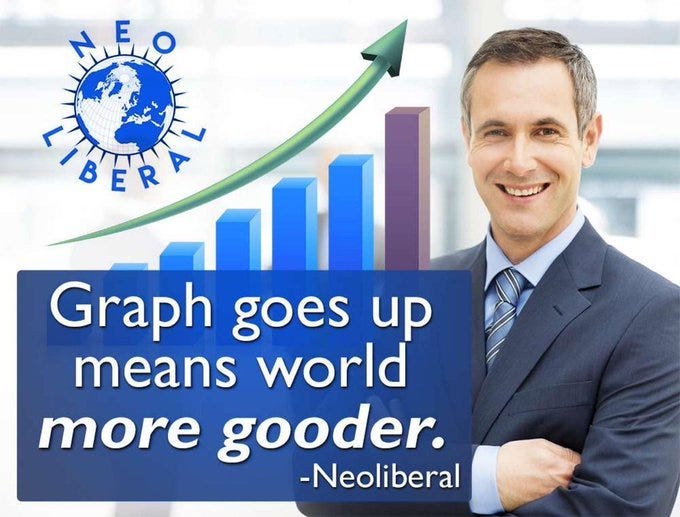
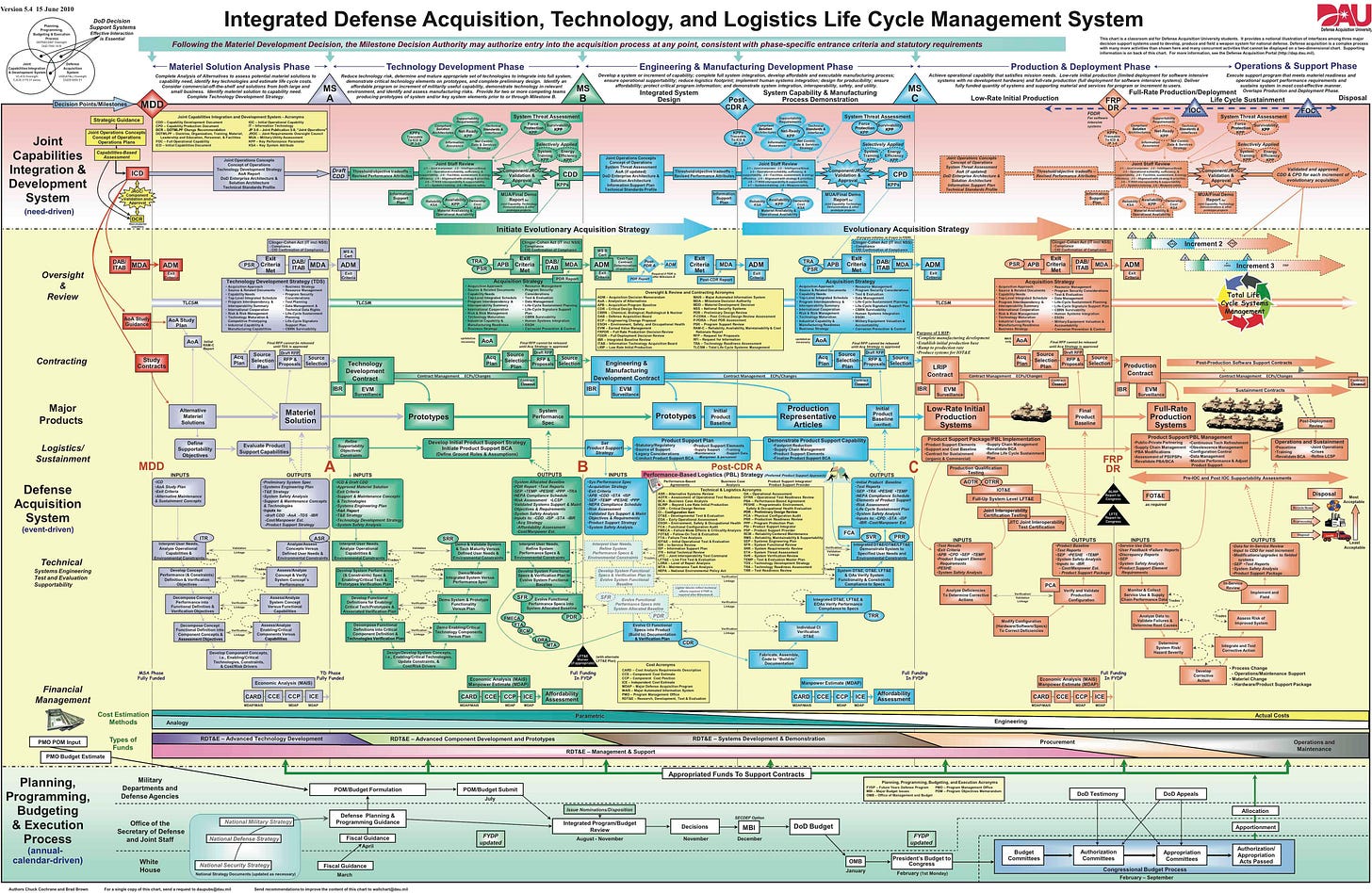
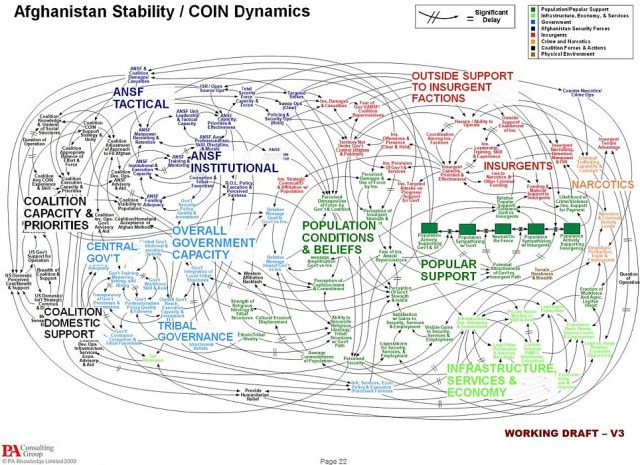


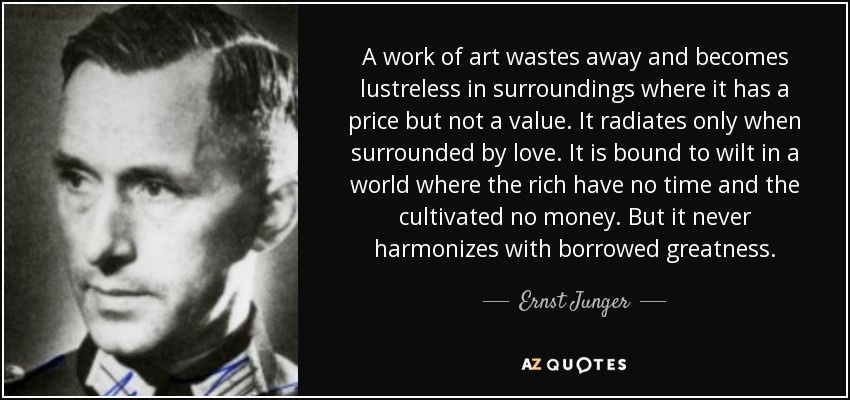

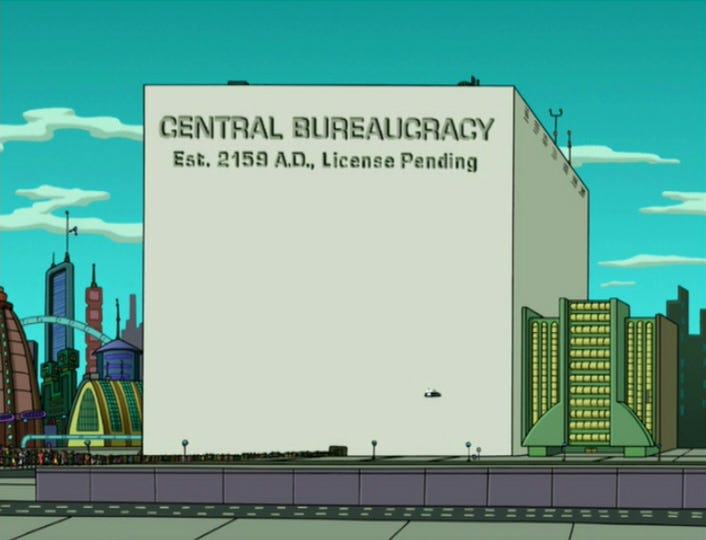









Tbh my goal in life is to make a secluded monarchist town and run a private game company that produces epic kino while larping as the King of Texas
You should write a dystopian novel. It could easily be the 1984 of the 21st century